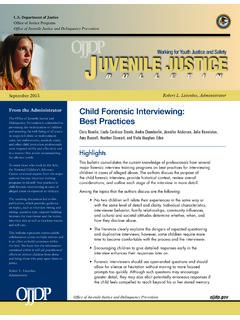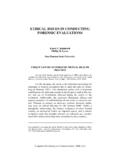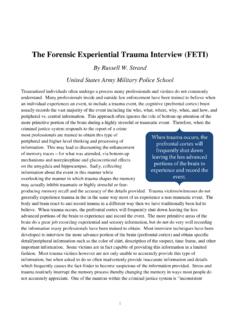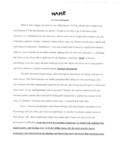Transcription of The Child Interview. Practice Guidelines - canee.net
1 Maria Keller-HamelaNobody's Children FoundationThe Child interview . Practice Guidelines 1. Rapport building and developmental assessment SettingqThe place of interview should by a neutral place, quiet and secure, there should not be toomany toys in the room, this distracts the Child . It is useful to keep the paper and crayons ready. qSit in such a way as to allow an eye level contact with the Child . If a small Child is sitting on thefloor, sit on the floor as well. Do not talk sitting behind a desk or a table, better sit at the tabletogether with the Child . Sit close to the Child but not too close. Do not enter "the Child 's terri-tory", it might be too endangering for people are present during your talk with a Child , better it is. The best solution would beto have a person, specially trained in this field, conducting the talk with the Child . The police-man and the prosecutor could observe the interview and prepare the report while sitting in adifferent room behind an one way mirror.
2 In our realities this is difficult to realize. Under theregulations of the Polish law, a psychologist has to be present during the interviewing the childalong with prosecutor or policeman. Since we do not have special premises for interviewingchildren, we should strive to limit the number of people to two persons the policeman orthe prosecutor and the psychologist, conducting the interview with the Child . If a sexual abuseis suspected, the compliance of sexes between the person, conducting the interview and thechild, the victim, can be the issue in certain age of the Child , but the most important is the skillsof the interviewerqAllow a Child to get used to the new place, to look the room , the first contactqGreet a Child by its first open and the Child where, during the interview , will be his/hers parents or yourself to the Child , introduce other people; tell the Child who you are and what areyou doing here and what is the role of other people in a manner, understandable to the him/her what are you going to emphatic, pay attention to any symptoms of nervousness in the asking questions, beginning with questions pertaining to the Child 's life where are yougoing to school or nursery, what do you like doing.
3 Use the knowledge you have of the childto formulate the questions. For example: if you know that the Child is lonely and does not haveany friends, a question "How is your best friend called?" is a bad not ask questions, that could be coercive such as "do you want to be my friend?, shall westay friends?".qBe sensitive to the Child 's needs, react if the Child for example wants a drink or go to the children, not wanting to talk about something, try to postpone this situation. Theylook for an excuses to escape. If the Child says that it wants a drink and we will not permit him/herto do it, the resistance of the Child might increase, our chance to established a good contact withthe Child , the basis for getting the information on what really happened, may Developmental Level and Check SuggestibilityqWhile discussing familiar topic with the Child listen to the Child s speech and language, adapt yourlanguage and vocabularyqAsk Child to identify colorsqHave the Child demonstrate counting, check understanding prepositions: behind, in front of Information gathering of Set the basic rulesqAsk the Child why it is here, what did the others told him about things that will happen the meaning of a lie and a truth (particularly important with little children).
4 Quse an example to check whether the Child differentiates these concepts, "If I said that I havegreen hair, would that be a truth or a lie?"qexplain to the Child that today you want to talk only about the true fear and a secret do not ignore the fact that the Child is frighten explain that you are going to talk also about secretsqIn working with a Child , we have do dedicate a lot of time to differentiate between a bad secretand a good secret. The offender is anxious to avoid the punishment, he is very keen for thechild to keep the secret, not to tell it to anybody. He uses all kinds of pressures on the Child ,sometimes very obscure and cruel. Be aware that the Child can be very versus not knowing tell the Child that if it does not know an answer to a question it should not guess, it should say"Don't know". Assure the Child that it may not know answers to some of your questions andthat it is ok to say I don t know. You can give an example, to check whether the Child understands this (particularly importantwith little children), for example ask: "Where did I go for holiday last summer?
5 General Techniques for InterviewingqUse a language, understandable to the phrases containing only one question or one thought, simply words, simply tenses andshort sentences, don t use double negativesqAvoid the use if/then statements with young childrenqAgree with the Child common names, relating to persons, personal parts and sexual acts askhim/her what names do they first names, uncle Andrew, do not use personal pronouns, such as he. qBe specific in your questions young children are very literalqAlways ask the Child to explain the words or expressions which you do not the pace of the interview according to the Child s abilities to open up. Be the Child covers its face or eyes, lowers its voice or whispers, when answering the questions let him/her do your emotions, the tone of your voice, your mimics, do not show curiosity or shock,regardless of what the Child a Child has difficulty in talking about abuse ask him to show on dolls or draw a pictureqBegin by encouraging a narrative account by using an open-ended questions such as tell mewhat happened.
6 QPrompt narrative by stating tell me more or what happened next? qMove from general questions to more specific regarding critical people and eventsqBe careful with yes-no questionsqHave a list of questions that you must not omit prepared (either in your head or on the paper).3. What you must not do qDo not lecture during the interview . qNever praise or promise an award for giving not coerce the answer, even if you know that the Child is lying or is not disclosing a pieceof information it must know. If you have an information that the Child told somebody elsesomething different, it is alright to ask the Child to clarify your confusion. Do not pressure, if thechild does not want to ask the Child how it would like to punish the offender, what, according to the Child ,should be the punishment for the things he did to the not judge any of the answers, given by the not correct the "wrong answer", ask for not lead the Child by suggesting information regarding the abuseqDo not show the annoyance, when you did not manage to get the information you wanted tohear, better stop and take a short not hurry the Child , which is not ready to talk.
7 Better arrange for another not ask the Child why the offender hurt him. The Child does not know and often blames itself. qDo not ask whether the Child loves the offender and whether the offender loves the not make promises you can t keep nothing bad is ever going to happen to you promise the Child that you are not going tell anybody about things you will hear fromhim. It might be that this case has to be Closing the interview very important qExplain to the Child what will happen nextqPraise Child for effort not for the contentqAddress any questions the Child might have3Ma gorzata Toeplitz-WiniewskaPsychology Department, SWPS (Higher School of Social Psychology), WarsawPsychology Department, Warsaw UniversityDevelopment Stages and Methods of Interviewing Children This paper attempts to define the characteristics of a Child 's cognitive, emotional, motivational,and social development at different life stages, and formulate the resulting Guidelines forinterviewers, who elicit information about offences from children.
8 Moreover, the article offersseveral recommendations concerning interviewing children, which stem from research on childwitnesses Children frequently perform the difficult witness's role in criminal proceedings. A Child may bejust a witness to an offence, but more often he or she is both a witness and the victim. In both casesthe experience of being a witness is extremely difficult and distressful for the Child . Undoubtedly,however, when the Child has been victimized by the offender, the situation becomes , more and more frequently the testimony of a Child victim of physical or emotionalviolence or sexual abuse is the only way to stop the Child s suffering and punish the offender. Theperson interviewing a Child witness faces two major tasks:1. to elicit a complete, credible account of the offence;2. to protect the Child s psychological well-being, which has been seriously harmed by theabuse performance of these tasks requires deep understanding of developmental processesand age-related changes in children's psychological and social functioning.
9 In order to elicit information about an event, which the Child has witnessed or participated in, theinterviewer must have fundamental knowledge about the Child s development on various dimensions:cognitive, emotional, motivational, and social. Such knowledge is necessary to obtain a credibleaccount of the Child 's actual experiences. At the same time, the interviewer must keep in mind thatreturning to the drastic, traumatic, and often incomprehensible events, is in itself a strong distressfulexperience for the Child . The adult interviewer's task is to talk to the Child in a way that avoids reinforcingthe traumatic experience through evoking it, and minimizes the effects of the interview -related stress. Being aware of children's vulnerability in this difficult situation, psychologists believe that only pro-fessionals experienced in developmental, clinical, and forensic psychology, and prepared to conductinterviews with children victimized by adult offenders, are able to elicit complete information aboutthe offence during such interviews (Dezwirek-Sas, 1992; Saywitz, 1993, in: Ackerman, 1999).
10 Thus psychologists interviewing Child witnesses does not perform a limited role of an interroga-tor, as they are responsible not only for eliciting a complete account of the offence, but also forprotecting the Child s psychological well-being. In many countries special programs have been con-ducted, aimed at protecting children from multiple interviews at various stages of the law enforce-ment process. However, it is not always possible to avoid the Child s appearance in Child interviewers must have necessary knowledge about how to talk to children, takinginto account the specifics of their developmental establishing a rapport with a Child victimized by adults, the interviewer has to dispel sev-eral fears experienced by abused children regardless of their age. First of all the Child might feelguilty of the offence. This sense of guilt has often been instilled in the victim by the may also fear that they will be taken away from home and placed in jail or a house ofdetention.





